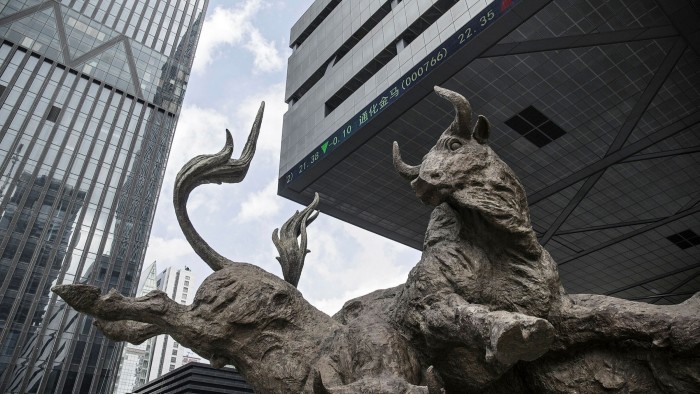Renminbi jumps by most in 15 years as China returns to work

Roula Khalaf, Editor of the FT, selects her favourite stories in this weekly newsletter.
China’s currency staged its biggest rally in 15 years on Friday, buoyed by a wave of foreign demand for Chinese assets and rising expectations that a Joe Biden victory in next month’s US presidential election could help reset relations between the two superpowers.
The onshore renminbi, which had not traded since September 30 due to the lengthy National Day holiday, rose as much as 1.45 per cent on Friday to Rmb6.6930 per dollar — the biggest one-day rise since the currency depegged from the dollar in 2005. The internationally-traded offshore renminbi, which traded throughout the holiday and is more loosely regulated, climbed 0.9 per cent to Rmb6.68.
Demand for Chinese assets has been booming since the coronavirus crisis ripped through global markets in March, due to an accelerating economic recovery in the country and the relatively lofty returns available from its bonds. Now, the increasing prospect of a Biden win in next month’s US presidential election, particularly with the potential for a “blue wave” for the Democrats in both houses of Congress, has helped to lift the Chinese currency further.
“The view in the market is that the way a Biden administration approaches [US-China relations] is probably going to be less confrontational and certainly using trade less as a tool or weapon against China,” said Daniel Been, head of foreign exchange strategy at ANZ.
Kaspar Hense, a portfolio manager at BlueBay, said the offshore-traded currency could strengthen to as high as Rmb6.50 over the next three to six months.
Economic data releases indicate that China is rebounding from the shock of the pandemic. On Friday, the Caixin China General Services purchasing managers’ index, an independent measure of the services sector, showed activity climbed to its highest level in three months in September.
Larry Hu, chief China economist at Macquarie, pointed to rising retail sales and a “significant” 17 per cent year-on-year jump in domestic passenger traffic at Shanghai’s airport during the holiday. “It’s clear that consumption, especially service consumption, is on the mend,” he added.
That stands in contrast to the US, where authorities are still battling to contain the spread of Covid-19 and politicians are wrangling in Washington over a new fiscal support package.
Christy Tan, head of Asia markets strategy at National Australia Bank, said Chinese authorities were showing a greater willingness to let the renminbi climb — a break from historical efforts to dampen the currency in an effort to support trade.
“The prospect of renminbi appreciation is getting more structural — it’s no longer just cyclical,” Ms Tan said. “There’s a sense of confidence that the renminbi is getting more internationalised.”
Flows into China’s equities market have topped Rmb90bn ($13.4bn) this year, taking foreign holdings to more than Rmb1tn. Flows into the bond markets in the year to August exceeded Rmb615bn, bringing foreign holdings to Rmb2.8tn
The currency’s path now hinges on the US vote on November 3. “The higher likelihood of blue sweep after the first presidential debate opens up room for more renminbi appreciation,” said Lu Sun, a strategist at US bank Citi. “A Biden win would likely be positive for the currency, and a Trump win or contested result negative”.
Comments